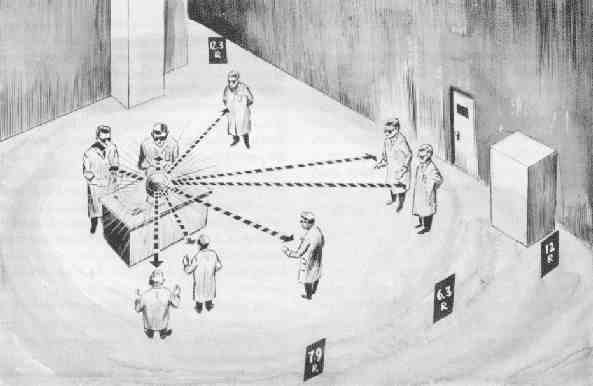|
Soviet Submarine K-8
''K-8'' was a of the Soviet Northern Fleet that sank in the Bay of Biscay with her nuclear weapons on board on April 12, 1970. A fire on April 8 had disabled the submarine and it was being towed in rough seas. Fifty-two crewmen were killed attempting the salvage of the submarine when it sank. Accidents 1960 loss of coolant On 13 October 1960, while operating in the Barents Sea, ''K-8'' suffered a ruptured steam generator tube, causing a loss-of-coolant accident. While the crew jury-rigged a system to supply emergency cooling water to the reactor, preventing a reactor core meltdown, large amounts of radioactive gas leaked out which contaminated the entire vessel. The gas radiation In physics, radiation is the emission or transmission of energy in the form of waves or particles through space or a material medium. This includes: * ''electromagnetic radiation'' consisting of photons, such as radio waves, microwaves, infr ... levels could not be determined because in ... [...More Info...] [...Related Items...] OR: [Wikipedia] [Google] [Baidu] |
Bay Of Biscay
The Bay of Biscay ( ) is a gulf of the northeast Atlantic Ocean located south of the Celtic Sea. It lies along the western coast of France from Point Penmarc'h to the Spanish border, and along the northern coast of Spain, extending westward to Cape Ortegal. The average depth is and the greatest depth is . Etymology The Bay of Biscay is known in Spain as the Gulf of Biscay (; ). In France, it is called the Gulf of Gascony ( ; ; ; ). In Latin, the bay was known as ( Cantabrian Gulf); the name Cantabrian Sea is still used locally for the southern area of the Bay of Biscay that washes over the northern coast of Spain ( Cantabria). The English name comes from Biscay on the northern Spanish coast, probably standing for the western Basque districts (''Biscay'' up to the early 19th century). Geography Parts of the continental shelf extend far into the bay, resulting in fairly shallow waters in many areas and thus the rough seas for which the region is known. Heavy storms ... [...More Info...] [...Related Items...] OR: [Wikipedia] [Google] [Baidu] |
List Of Military Nuclear Accidents
This article lists notable military accidents involving nuclear material. Civilian accidents are listed at List of civilian nuclear accidents. For a general discussion of both civilian and military accidents, see nuclear and radiation accidents. For other lists, see Lists of nuclear disasters and radioactive incidents. Scope of this article In listing military nuclear accidents, the following criteria have been adopted: # There must be well-attested and substantial health risks associated with nuclear materials; or, it must involve nuclear weapons (even if lacking an installed fissile core or if nuclear detonation was not possible). # To qualify as "military", the nuclear operation/material must be principally for military purposes. # To qualify as "accident", the damage should not be intentional, unlike in nuclear warfare. This list may be incomplete due to military secrecy. 1940s 1950s 1960s 1970s 1980s 1990s 2000s 2010s See also *1983 Soviet nuclear false ... [...More Info...] [...Related Items...] OR: [Wikipedia] [Google] [Baidu] |
Shipwrecks In The Bay Of Biscay
A shipwreck is the wreckage of a ship that is located either beached on land or sunken to the bottom of a body of water. It results from the event of ''shipwrecking'', which may be intentional or unintentional. There were approximately three million shipwrecks worldwide as of January 1999, according to Angela Croome, a science writer and author who specialized in the history of underwater archaeology (an estimate rapidly endorsed by UNESCO and other organizations). When a ship's crew has died or abandoned the ship, and the ship has remained adrift but unsunk, they are instead referred to as ''ghost ships''. Types Historic wrecks are attractive to maritime archaeologists because they preserve historical information: for example, studying the wreck of revealed information about seafaring, warfare, and life in the 16th century. Military wrecks, caused by a skirmish at sea, are studied to find details about the historic event; they reveal much about the battle that occur ... [...More Info...] [...Related Items...] OR: [Wikipedia] [Google] [Baidu] |
Ships Built In The Soviet Union
A ship is a large watercraft, vessel that travels the world's oceans and other Waterway, navigable waterways, carrying cargo or passengers, or in support of specialized missions, such as defense, research and fishing. Ships are generally distinguished from boats, based on size, shape, load capacity and purpose. Ships have supported Geographic exploration, exploration, Global trade, trade, Naval warfare, warfare, Human migration, migration, colonization, and science. Ship transport is responsible for the largest portion of world commerce. The word ''ship'' has meant, depending on the era and the context, either just a large vessel or specifically a Full-rigged ship, ship-rigged sailing ship with three or more masts, each of which is Square rig, square-rigged. The earliest historical evidence of boats is found in Egypt during the 4th millennium BCE. In 2024, ships had a global cargo capacity of 2.4 billion tons, with the three largest classes being ships carrying dry bulk (43%), ... [...More Info...] [...Related Items...] OR: [Wikipedia] [Google] [Baidu] |
Nuclear Submarines Of The Soviet Navy
Nuclear may refer to: Physics Relating to the nucleus of the atom: *Nuclear engineering *Nuclear physics *Nuclear power *Nuclear reactor *Nuclear weapon *Nuclear medicine *Radiation therapy *Nuclear warfare Mathematics *Nuclear space *Nuclear operator *Nuclear congruence *Nuclear C*-algebra Biology Relating to the nucleus of the cell: * Nuclear DNA Society *Nuclear family, a family consisting of a pair of adults and their children Music * "Nuclear" (band), chilean thrash metal band * "Nuclear" (Ryan Adams song), 2002 *"Nuclear", a song by Mike Oldfield from his ''Man on the Rocks'' album * ''Nu.Clear'' (EP) by South Korean girl group CLC Films * ''Nuclear'' (film), a 2022 documentary by Oliver Stone. See also *Nucleus (other) *Nucleolus *Nucleation *Nucleic acid *Nucular ''Nucular'' is a common, proscribed pronunciation of the word "nuclear". It is a rough phonetic spelling of . The ''Oxford English Dictionary''s entry dates the word's first published appeara ... [...More Info...] [...Related Items...] OR: [Wikipedia] [Google] [Baidu] |
Maritime Incidents In The Soviet Union
Maritime may refer to: Geography * Maritime Alps, a mountain range in the southwestern part of the Alps * Maritime Region, a region in Togo * Maritime Southeast Asia * The Maritimes, the Canadian provinces of Nova Scotia, New Brunswick, and Prince Edward Island * Maritime County, former county of Poland, existing from 1927 to 1939, and from 1945 to 1951 * Neustadt District, Reichsgau Danzig-West Prussia, known from 1939 to 1942 as ''Maritime District'', a former district of Reichsgau Danzig-West Prussia, Nazi Germany, from 1939 to 1945 * The Maritime Republics, thalassocratic city-states on the Italian peninsula during the Middle Ages Museums * Maritime museum (sometimes nautical museum), a museum for the display of objects relating to ships and travel on large bodies of water. * Maritime Museum (Belize) * Maritime Museum (Macau), China * Maritime Museum (Malaysia) * Maritime Museum (Stockholm), Sweden Music * ''Maritime'' (album), a 2005 album by Minotaur Shock * Maritime ... [...More Info...] [...Related Items...] OR: [Wikipedia] [Google] [Baidu] |
Lost Submarines Of The Soviet Union
Lost or LOST may refer to getting lost, or to: Arts, entertainment, and media Television * ''Lost'' (TV series), a 2004 American drama series about people who become stranded on a mysterious island * ''Lost'' (2001 TV series), a short-lived American and UK reality series * ''Lost'' (South Korean TV series), a 2021 South Korean series * "Lost" (''The Bill''), a 1985 episode * "Lost" (''Stargate Universe''), an episode of science fiction series ''Stargate Universe'' *"Lost", an episode of ''Unleashed!'' *"Lost", an episode of the Canadian documentary TV series ''Mayday'' *"Lost", an episode of Disney's ''So Weird'' * "The Lost" (''Class''), an episode of the first series of the ''Doctor Who'' spin-off series ''Class'' Films * ''Lost'' (1950 film), a Mexican film directed by Fernando A. Rivero * ''Lost'' (1956 film), a British thriller starring David Farrar * ''Lost'' (1983 film), an American film directed by Al Adamson * ''Lost!'' (film), a 1986 Canadian film directed by Peter R ... [...More Info...] [...Related Items...] OR: [Wikipedia] [Google] [Baidu] |
Cold War Submarines Of The Soviet Union
Cold is the presence of low temperature, especially in the atmosphere. In common usage, cold is often a subjective perception. A lower bound to temperature is absolute zero, defined as 0.00K on the Kelvin scale, an absolute thermodynamic temperature scale. This corresponds to on the Celsius scale, on the Fahrenheit scale, and on the Rankine scale. Since temperature relates to the thermal energy held by an object or a sample of matter, which is the kinetic energy of the random motion of the particle constituents of matter, an object will have less thermal energy when it is colder and more when it is hotter. If it were possible to cool a system to absolute zero, all motion of the particles in a sample of matter would cease and they would be at complete rest in the classical sense. The object could be described as having zero thermal energy. Microscopically in the description of quantum mechanics, however, matter still has zero-point energy even at absolute zero, because ... [...More Info...] [...Related Items...] OR: [Wikipedia] [Google] [Baidu] |



